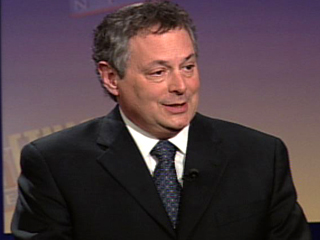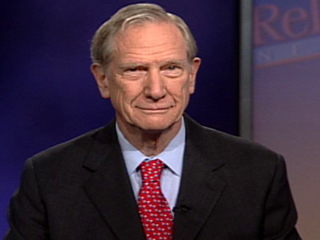In This Episode << SLIDE LEFT TO SEE ADDITIONAL SEGMENTS
Israeli Election
[MYPLAYLIST=5]
BOB ABERNETHY, anchor: In the aftermath of Israel’s incursion into Gaza, Amnesty International says there is evidence of war crimes by both sides during the fighting. Meanwhile, both Israel and Hamas are restricting the flow of humanitarian aid into Gaza — Israel because it is concerned about arms smuggling and Hamas because it wants more control over the aid. In Tuesday’s Israeli elections, hardliners picked up seats in the Parliament, indicating that whoever finally becomes Prime Minister will take a tougher stance on peace negotiations with the Palestinians.
So where does all that leave the outlook for Middle East peace? Warren Clark is a former Ambassador who is Executive Director of Churches for Middle East Peace. Jack Moline is the Rabbi at Agudas Achim Congregation in Alexandria, Virginia. Welcome to you both. Rabbi Moline, what’s the outlook?
Rabbi JACK MOLINE (Agudas Achim Congregation, Alexandria, Virginia): It’s a little hard to tell, Bob. It could be that this could be a huge opportunity in Israeli and Palestinian relationships. Any change in circumstance I think presents an opportunity, and I’m hoping this is one that both sides will take.
ABERNETHY: Why? Why is it a new opportunity?
Rabbi MOLINE: The shift in government in Israel to a government that at least has support of an electorate.
ABERNETHY: With more hardliners in the government?
Rabbi MOLINE: Well, you know, it’s very interesting. The last two prime ministers of Israel campaigned on promises to take a harder line against Palestinian statehood, and both of them turned out being, by some standard at least, the more progressive prime ministers that there were. The withdrawal from Gaza and the proclamation by Olmert that an independent Palestinian state was desirable was a surprise to everybody.
ABERNETHY: So hardliners might be able to do more toward negotiating peace?
Rabbi MOLINE: I think you say one thing to get into office, and you find out you have to do other things once you’re there.
ABERNETHY: Ambassador, what’s your sense of where we are?
WARREN CLARK (Former Ambassador and Executive Director, Churches for Middle East Peace): I would say there’s another opportunity, which is the new government here in the United States. We have a new president, a new secretary of state. The president and the secretary have appointed a new Middle East envoy, Senator [George] Mitchell, and I think that’s new. For most of the Bush administration there was not a forward-leaning U.S. government promoting peace between Israel and the Palestinians.
Rabbi MOLINE: Although I’ll tell you one of the things that President Bush did that no other president was able to do was to call for a Palestinian state, independent, alongside of Israel, and I think another example of how that can happen.
ABERNETHY: And you think that’s the only objective too, right? A two-state solution?
Mr. CLARK: I’m afraid anything else is going to be much worse. If you are talking about continuation of the occupation or unilateral Israeli control, it’s an invitation for endless conflict.
ABERNETHY: You know, decade after decade American presidents, American people, have tried to promote successful negotiations between Israel and its neighbors, and it never gets anywhere, and is there anything new that the new president, Senator Mitchell, or anybody can think of that might not have been tried before, that might lead to some kind of breakthrough, Jack?
Rabbi MOLINE: I’m not sure that we can say that there’s been no progress. There are qualitative differences between the relationships of Israelis and Palestinians now than there were 20 to 25 years ago when the Israeli government prohibited its representatives from even speaking with representatives of the Palestinian nation. So progress is not happening at the rate we’d like it to, and certainly the violence that’s the result of that slow progress is something we all deplore, but I think that, as I said, any change is an opportunity, and we should go with the slow momentum.
ABERNETHY: Well, it certainly is that.
Rabbi MOLINE: It is.
Mr. CLARK: I have another concern about the situation right now and how it’s different, and that’s the demographic situation. The population of the Palestinians is growing faster than that of Israel, and unless there is a two-state solution pretty soon, the opportunity’s really going to be lost.
ABERNETHY: What about some kind of popular movement in the Middle East here? What can American churches do? What can the American Jewish community do? What opportunities are there for pressure coming up from the bottom that might change what the governments do, Ambassador?
Mr. CLARK: I would say we need to continue the kind of communication and dialogue that goes on between the Christian community and the Jewish community. We try to do that here in Washington with Churches for Middle East Peace. I think there’s a lot of ignorance in the United States about the tragedy in the Middle East and that there are real opportunities for peace.
Rabbi MOLINE: And I think you would find that within all of the American communities — Jewish, Christian, even the American Arab community. There are clusters of people who are working very hard on a variety of levels to find some resolution. You have people who are a little more liberal looking for cooperation, people a little harder to the right looking for a more militant solution. But the variety is there. The idea is to allow those voices to rise
ABERNETHY: Very quickly, Ambassador, you’ve said that the window is closing on opportunity, and I assume you mean by that that the Arab population is increasing so fast?
Mr. CLARK: That’s part of it. The other part of it is the Israeli settlements in the Palestinian territories continue to expand. They’ve never really stopped. Every president since Nixon has said they should stop. But there’s been greater expansion since the Annapolis conference a year ago than before.
ABERNETHY: But the bottom line for both of you is that there is still some chance?
Rabbi MOLINE: Where there’s life there’s hope
Mr. CLARK: It’s not impossible.
ABERNETHY: Ambassador Warren Clark, Rabbi Jack Moline, many thanks.
Rabbi MOLINE: Thank you, Bob.
Mr. CLARK: Thank you.



